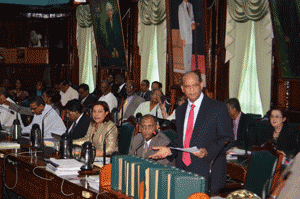OFFICIALS of the Guyana Power and Light (GPL) Inc. believe that the decision by the political opposition to cut the allocations to the power company
was made in “total ignorance.”
Hence, GPL Chief Executive Officer (CEO), Mr. Bharat Dindyal, told this newspaper at a press conference, yesterday,  that the company is willing to ‘sit down’ with the opposition to provide it with further “factual information” that could see the cut revisited and the decision reversed.
that the company is willing to ‘sit down’ with the opposition to provide it with further “factual information” that could see the cut revisited and the decision reversed.
Dindyal hosted the media briefing at GPL’s office on Duke Street, Kingston, along with its Chairman Winston Brassington and Deputy CEO Aeshwar Deonarine.
The combined opposition last Wednesday slashed another $5.2B from the 2013 Budgetary Allocations, targeting the power company that falls under the Office of the Prime Minister. The cut was  triggered by a motion set in play by A Partnership for National Unity’s (APNU) Carl Greenidge, reducing the capital support for GPL from its $10.2B request to $5B.
triggered by a motion set in play by A Partnership for National Unity’s (APNU) Carl Greenidge, reducing the capital support for GPL from its $10.2B request to $5B.
“We are trying as hard as possible at our level to provide factual information to them, which we could sit with them and discuss, if they so desire. It is basically up to them to say now that they did not understand certain things. The opportunity is still there for them to revisit the cuts. We think that good sense should prevail because we are still convinced that this was not done in knowledge,” Dindyal told this newspaper.
Meanwhile, during the conference, Brassington said the money that was cut essentially was to fund GPL’s capital programme. “GPL prepared a five year investment plan called the Development and Expansion Plan. It’s a public document and we are bound by it. All of these funds were coming from identified third party sources of funding at concessional rates. So, again, it doesn’t make sense why they would just cut it. Some of the programmes are ongoing.”
He continued, “It’s very short-sighted of the opposition. They didn’t give any explanation. There is abundant information in the public. People forget we are a regulated utility. How we receive and spend our money is accounted for. It’s very unfortunate. Maybe they may want to revisit this and give us back our funds. That would be great. Otherwise we would have to deal with the consequences.”
The Deputy CEO said GPL is faced with a paradox in that along with slashing the budgetary allocations, the opposition has asked for a reduction in tariffs. “We don’t have enough yet they want to reduce. They seem also to forget that we have statutory targets to meet. If we fail to reach these targets, the PUC (Public Utilities Commission) has the right to apply financial penalties against this company.”
Deonarine further commented that though $10B may sound as a significant sum, it really amounts to peanuts when taken in the context of the electric utility industry.
Advanced Projects
Dindyal observed that an “enormous amount of time, effort, sweat and tears,” went into major projects that are at an advanced stage, but would immediately have to be halted should the cut not be reversed.
“The main programmes which we are currently implementing…some of them as far as 85 percent complete. Imagine at this stage they are saying sorry, you not going to receive any money to complete these facilities,” Dindyal remarked.
The media was shown photos of these projects on a projector.
For example, some US $32M has already been expended on the 26 megawatt power plant at Vreed-en-Hoop. The foundation works are in progress and all of the equipment in Finland is waiting to be shipped to Guyana.
With regard to the frequency conversion in Kingston, GPL is spending US $7.2M to convert four 5 ½ megawatt machines. Two of these machines have been converted already and the commissioning has already started. “Do we abandon these projects now?” Dindyal asked.
He said the transmission programme which was affected by the cut was on the cards since during the 1970s. “Now, 30 odd years later, we are almost there. We have most of the money, the contractor is here and the work is about to start. In fact, preliminary works have already been done, but we are told, ‘Sorry you can’t continue with it.’
“So we basically can’t build the link between Sophia, the Demerara/Berbice system, so the Berbice people basically cannot benefit from additional capacity which we want to put in Demerara.
“We can’t generate addition power by the end of this year. We can’t link Berbice; and Demerara would run into trouble next year because we won’t have enough reliable capacity. So Demerara is affected; Berbice is in trouble because we can’t bring any improvement to them; the people in the Central Corentyne, where we intended to build a new sub station to improve power quality, will continue to suffer,” Dindyal related.
The new sub station in south Georgetown, which was also halted, could have benefited consumers from Mandela Avenue to Water Street, between Hadfield Street all the way up to Rahaman’s Park on the East Bank.
“The fact of the matter is the parties who are making these cuts do they understand the stage to which these projects have progressed? And do they understand the implications for GPL? These things are basically out of ignorance. They might say it is a lack of information but it is just that they do not understand the information that they have. These things have no logic to them. I don’t know that any of these decisions are informed by a basic knowledge of what GPL is, and what we’re doing,” Dindyal stated.



.jpg)








